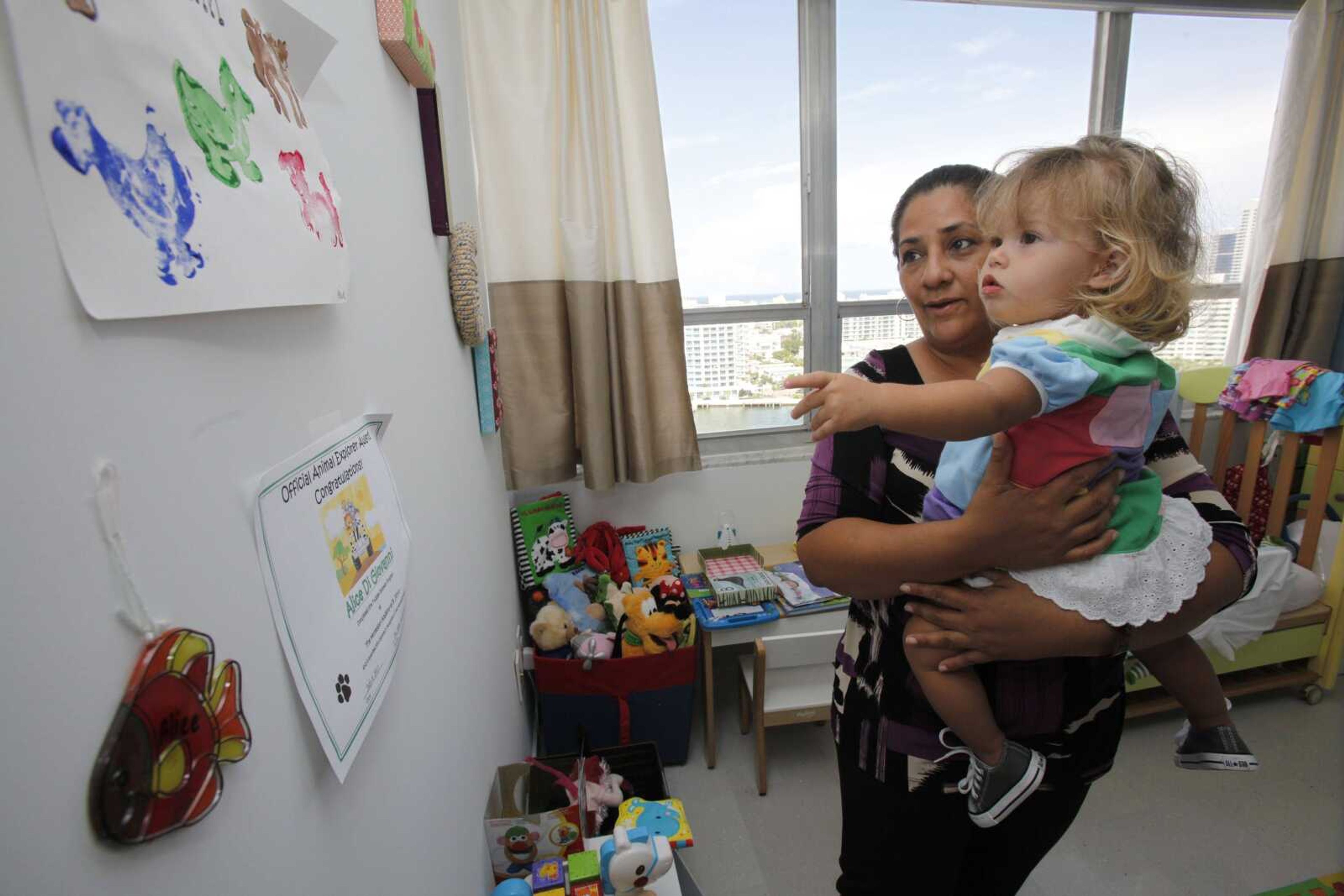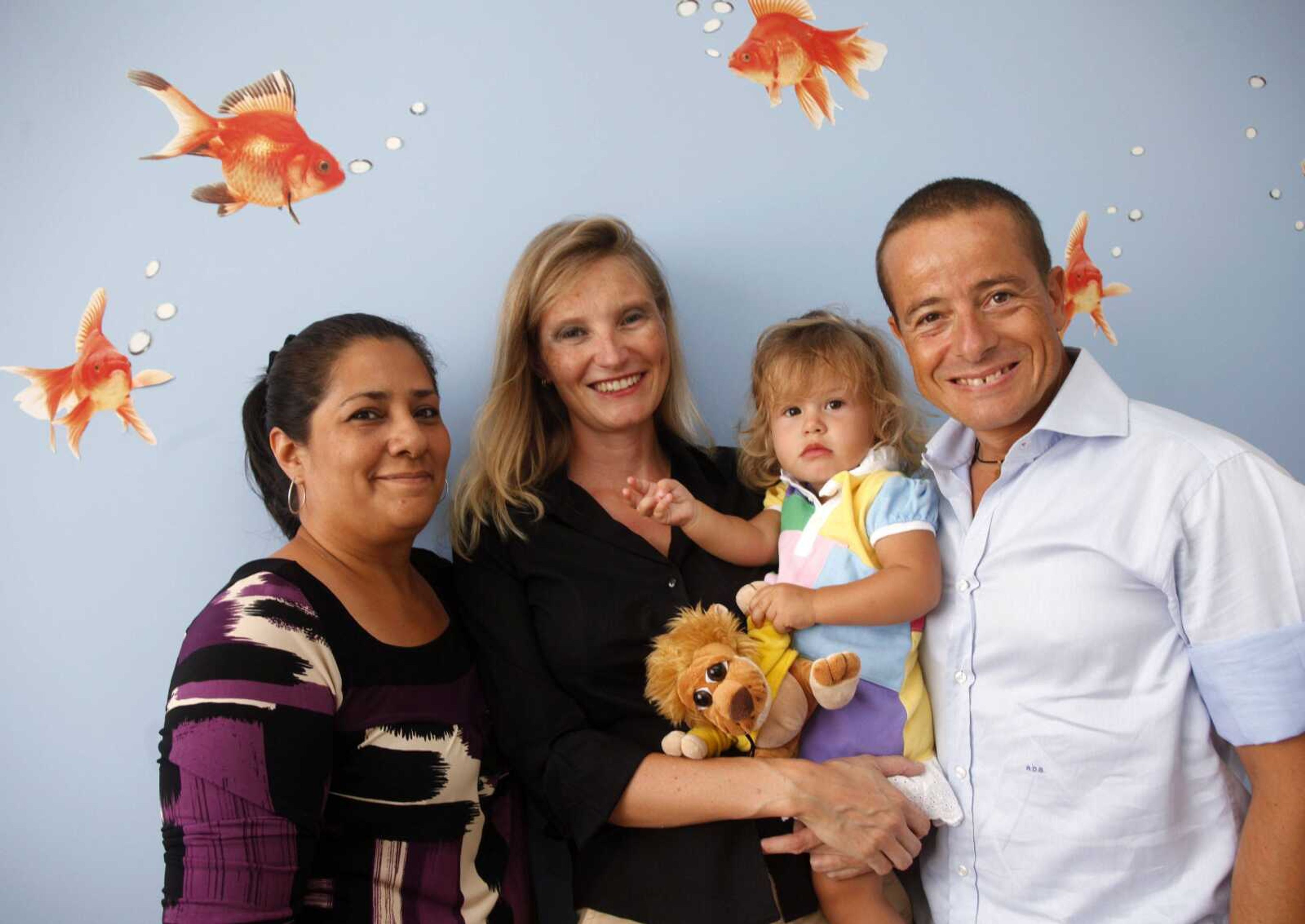Parents look for best ways to raise bilingual children
MIAMI -- One-year-old Alice Di Giovanni asks for "banane," not banana, when she's in the mood for one. She'll bid you farewell with a "ciao." And if she wants more, she says "mas." The Miami toddler is one of an increasing number of Americans living in homes where a language other than English is spoken, and her parents want her to learn as many languages as she can. So her Polish-Canadian mother speaks to her in French, her father in Italian and her Honduran nanny in Spanish...
MIAMI -- One-year-old Alice Di Giovanni asks for "banane," not banana, when she's in the mood for one. She'll bid you farewell with a "ciao." And if she wants more, she says "mas."
The Miami toddler is one of an increasing number of Americans living in homes where a language other than English is spoken, and her parents want her to learn as many languages as she can. So her Polish-Canadian mother speaks to her in French, her father in Italian and her Honduran nanny in Spanish.
"She kind of mixes these things, but I know she understands all three languages," said mom Anna Manikowska. Alice likely knows quite a bit of English, too, from living in an English-speaking environment and attending story time at her local library, Manikowska said. To top it off, her grandparents speak to her in Polish when they chat over Skype.
According to the U.S. census, in 1980, just 11 percent of Americans lived in homes where languages other than English were spoken. By 2007, the percentage had nearly doubled to 20 percent.

In some of these homes, immigrant parents may not know English well enough to teach it to their children. But the issues are different for parents who speak several languages well. While past generations of Americans sometimes encouraged children to abandon mother tongues in order to assimilate faster, today's parents see the benefits of being fluent in more than one language, and they look for ways to encourage it.
Not only does speaking more than one language preserve cultural ties and perhaps open up future career opportunities in an increasingly global economy, but scientific research suggests that bilingualism is good for you, making the brain more flexible. One study found that speaking more than one language may even slow the onset of Alzheimer's.
Parents intent on raising multilingual children often cite methods like OPOL (one parent, one language) and mL@H (minority language at home). OPOL was coined by French linguist Maurice Grammont in 1902. The term mL@H is newer, but the concept has been discussed by linguists since the early 20th century. The benefits and drawbacks of each method are a hot topic of debate by parents and educators in blogs and online forums.
For Manikowska, her strategy boiled down to two rules: People should speak to Alice in their mother tongue, rather than an acquired language that doesn't come to them as naturally, and they should stick to that one language when talking to her.
The latest research backs up Manikowska's approach.
Experts say children, even infants, can sense whether adults are comfortable in the language they're speaking. And it's difficult to relearn a language properly once you've learned it incorrectly from a nonnative speaker.
Valerie Berset-Price, who does international business consulting, studied multilingualism research while writing grants for a French school in Portland, Ore. She was most convinced by a school of thought that says people's brains assign a certain language to each person. So if your mother always speaks to you in Mandarin, when you hear her voice, your brain switches to Mandarin mode and it takes a concerted effort to speak to her in any other language. This is why experts emphasize the need to be consistent in whatever language you speak with your child.
Berset-Price has spoken nothing but French to her 7-year-old daughter. When Collette has friends over, Berset-Price will address her in French and ask her to translate for her friends, or she'll speak in French to her daughter, then in English to her friends.
"It's a lot of work," Berset-Price acknowledges, but she said it's the only way to maintain more than one language.
Yelena McManaman of Raleigh, N.C., crafted her approach to raising her bilingual son, Mark, by watching what didn't work with her friends. Many of their children understand Russian but only respond in English. When Mark says something to her in English, she'll ask him how to say it in Russian, or if she thinks he doesn't know, she'll repeat what he just said but in Russian so he learns it.
"I don't respond to him in English, ever," McManaman said, even in public.
Doing otherwise, she says, "confuses the children and it sends the message that in public it is more desirable to speak English. So I'm pretty strict about that."
She also took it in stride when, at age 2, Mark's vocabulary consisted only of basic words, because she knew he was working on two languages at once. She also didn't sweat it when he'd mix the two languages in a single sentence. Friends of hers in the same situation got worried about their children being delayed or confusing the languages, and they ultimately stopped speaking Russian. But by 2 1/2, those hiccups had resolved and Mark was speaking in full sentences in both languages. Now 4, Mark seamlessly addresses his mother in Russian and his father in English.
There are a few cases where a language delay is of concern, McManaman says, but "I think a lot of parents drop the attempts too early."

Experts say it's well worth it to stick it through. In her new book "SuperBaby: 12 Ways to Give Your Child a Head Start in the First 3 Years," author Jenn Berman lists the numerous benefits of bilingualism -- higher scores on IQ tests, better problem-solving skills, heightened language development, increased math ability, more cultural sensitivity and bigger earning potential.
Berman is less of a stickler when it comes to parents' level of proficiency in the language they're trying to pass on.
"Having someone who is fluent is ideal, but some exposure is better than no exposure in my mind," Berman said. She was fluent in Spanish as a child but has since forgotten most of it. With her own children, she read books with them in Spanish, which helped bring back her skills and, she hopes, gave them a foundation to make it easier for them to learn later in life.
There are other low-cost options for exposing children to different languages, Berman adds. Instead of hiring a baby sitter who only speaks English, pick one who speaks another tongue. Instead of taking your children to music class, take them to a Spanish music class. Instead of enrolling them in a regular public school, find one that's bilingual.
"To open up a whole world and culture to your child is such a great gift," Berman said. "And it's so relevant to the world we live in today."
Connect with the Southeast Missourian Newsroom:
For corrections to this story or other insights for the editor, click here. To submit a letter to the editor, click here. To learn about the Southeast Missourian’s AI Policy, click here.









